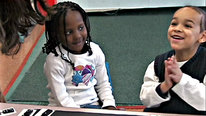September 2022: Inclusive Mathematics Classrooms: Advocating for Policies, Practices, and Resources

Theme's playlist
Expert Panel

September Expert Panel: Inclusive Mathematics Classrooms: Advocating for Policies, Practices, and Resources
Recorded Sept. 20, 2022 at 3:00 PM EDT
Description: This month’s expert panel webinar will explore and share different ways to support equitable instructional practice in mathematics classrooms for students and groups minoritized in the study of mathematics.
Join the Discussion! View Recording & Bios
Discussion
Read the discussion related to this theme.Related Resources
Transforming Practices and Policies So Multilingual Learners Thrive in Mathematics: A Position of the National Council of Teachers of Mathematics
Positioning Multilingual Learners for Success in Mathematics A joint position statement from NCSM: Leadership in Mathematics in Education and TODOS: Mathematics for ALL (Fall, 2021)
The imperative that all students, including English learners (ELs), achieve high academic standards and have opportunities to participate in science, technology, engineering, and mathematics (STEM) learning has become even more urgent and complex given shifts in science and mathematics standards.
A Pathway to Equitable Math Instruction is an integrated approach to mathematics that centers Black, Latinx, and Multilingual students in grades 6-8, addresses barriers to math equity, and aligns instruction to grade-level priority standards. The Pathway offers guidance and resources for educators to use now as they plan their curriculum, while also offering opportunities for ongoing self-reflection as they seek to develop an anti-racist math practice. The toolkit “strides” serve as multiple on-ramps for educators as they navigate the individual and collective journey from equity to anti-racism.
TRU is a framework for characterizing powerful learning environments in crisp and actionable ways. It provides a straightforward and accessible language for discussing what happens (and should happen) in classrooms, in professional preparation and Professional Development (PD). TRU is consistent with what we know to be good practice, and it focuses classroom and administrative attention on what counts in learning. What that means, in particular, is that high-quality instruction and PD will be consistent with TRU and that if we adopt this framework and language, parallels in instruction across disciplines will be clear.
The Mathematics Assessment Project is part of the Math Design Collaborative initiated by the Bill & Melinda Gates Foundation. The project set out to design and develop well-engineered tools for formative and summative assessment that expose students’ mathematical knowledge and reasoning, helping teachers guide them towards improvement and monitor progress. The tools are relevant to any curriculum that seeks to deepen students' understanding of mathematical concepts and develop their ability to apply that knowledge to non-routine problems.
Together Juntos Math is a 4-year project designed to develop and research innovative mathematical partnerships that engage teachers, parents, and multilingual 3rd through 5th-grade children in mathematical experiences. We aim to advance equity in mathematics education by integrating positioning theory and funds of knowledge. This research will take place at three sites across the U.S., in Arizona, Maryland, and Missouri, reflecting diverse geographic, cultural, and linguistic contexts. The researchers will study a model that merges professional learning and parental engagement with a focus on multilingual learners.
The report offers a fresh analysis of the issues surrounding foundational math - including a focus on the highest-leverage places for change - and spotlights models and immediate actions that offer clear strategies for equipping elementary teachers to enable authentic and joyful math learning for all students.





Kathryn Chval
Check out recent position statements:
https://www.nctm.org/Standards-and-Positions/Po...
https://www.mathedleadership.org/wp-content/upl...
Ibidunni Osundare
The panels and facilitators of the critical theme indicated the main implements based on the mathematical theories—the mathematical technology assistance based on the tiers and inclusive students.
Yes, Professional Development Sessions provide for all institutional teachers, faculties, and professors on how and what the students are strong and building learnings and communications for them.
If the students force into interventional tiers in which the subjects are new environmental supports. They understand the word maps when they let them know and recall the recent changes.
Joni Falk
Welcome all to the discussion on Inclusive Mathematics Classrooms. Our panelists will check in and reply during the week. Please post comments, queries, or share your own experiences. Thanks Kathryn Chval for posting two resources related to Multilingual learners (see first post.) I look forward to hearing from you! _ Joni
Salvador Huitzilopochtli
TODOS Mathematics for All has more position statements related to anti-racism (2020), multilingual learners (2021) , and social justice (2016). They are succinct and great resources that could add to the kinds of practices described in Dr. Jonee Wilson's video, ""Supporting Equitable Participation and Access" (see link above).
Babette Moeller
One key theme that emerged from our panel discussion was the importance for mathematics teachers to know their students as individuals and their strengths and challenges as learners. The Math for All video illustrates what you can learn when you ask students what helps them learn mathematics. If you are a math teacher, how do you get to know your students? Please share your strategies!